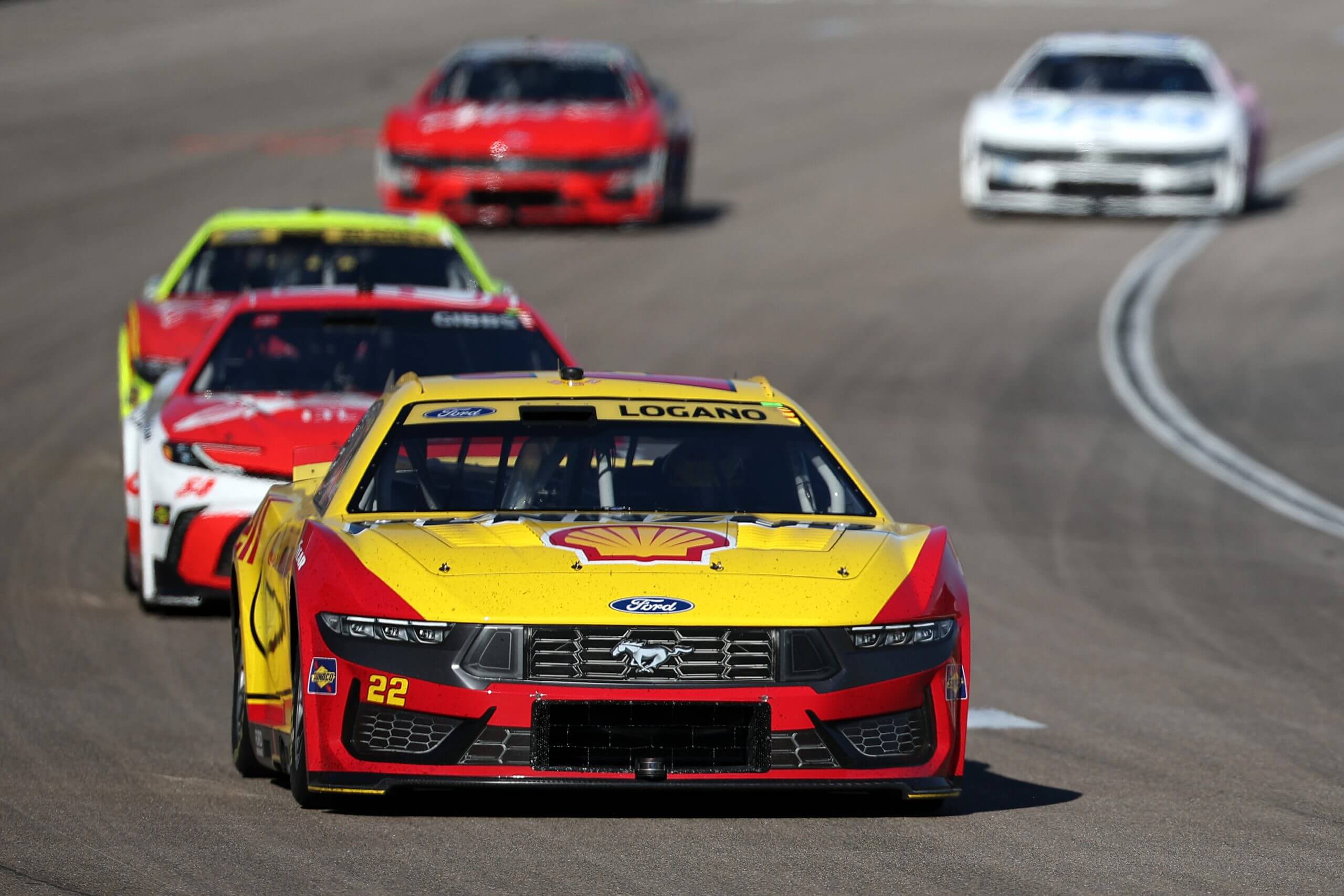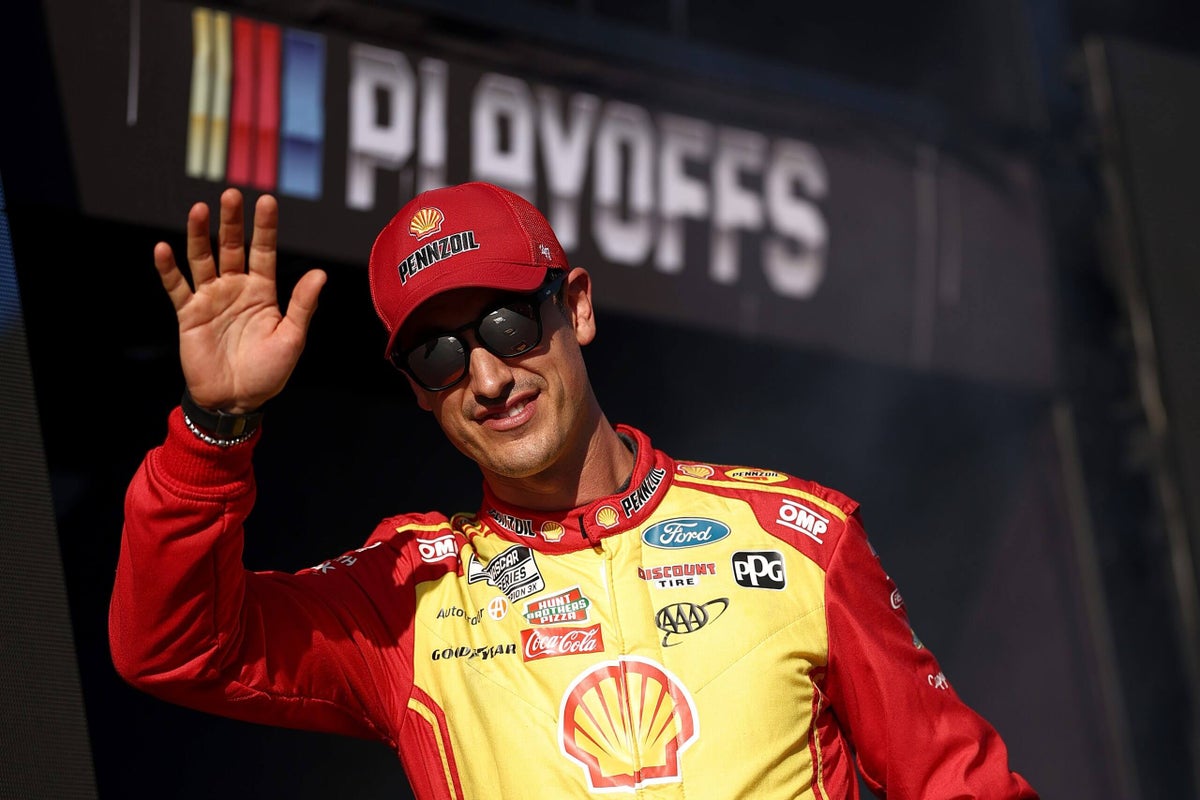Three-time and defending NASCAR Cup Series champion Joey Logano had just started a postrace television interview earlier this month when he suddenly heard a chorus of boos coming from the grandstands.
He looked up at Charlotte Motor Speedway’s big screen, wondering what all the fuss was about. Perhaps a couple of drivers had gotten into a fight on pit road, he figured.
Instead, he saw his own face staring back.
“That’s for me?” he thought of the boos. “What did I do?”
In reality, he knew exactly what he did: Refused to let his championship hopes die and advanced to NASCAR’s elite eight as arguably the slowest remaining car for yet another year.
So Logano reacted by looking right into the TV camera with a grin and saying: “We’re still here, we’re still alive, baby! We’re still going.”
Why did he decide to jab his detractors at that moment? Because, as Logano told The Athletic last week, he thought to himself: “These people are trying to take my joy away. I’m happy. Screw these people.”
If Logano did something wrong, he could accept being booed. But from his point of view, “All I did was my job.” And he has no interest in apologizing for that.
At the heart of the matter is this: Logano has become the face of a controversial NASCAR playoff format that is disliked by a significant portion of the fan base. NASCAR has a series of three-race elimination rounds followed by a one-race championship among four eligible drivers, and Logano has won all three of his titles with a survive-and-advance strategy to topple the favorites and defy the traditional image of a motorsports series champion.

Joey Logano will enter this weekend’s race at Talladega as one of the betting favorites. He might need the win to keep his hopes of title No. 4 alive. (Chris Graythen / Getty Images)
As an increasing amount of fans push back against the format, it has put Logano in a position to be its defender — which he does without hesitation — and he enthusiastically shares his view of how exciting and dramatic NASCAR playoff racing is.
“It’s unpredictable, do-or-die moments, Hail Mary moments,” Logano said. “And we’re gonna complain about that? It’s awesome. When we look back and talk about the good old days, the good old days are now. That’s why I’ll stand up and talk about it, because it doesn’t add up.”
But those who disagree or have an outright distaste for NASCAR’s current playoff system only get more annoyed when Logano defends it. As the influential Dale Earnhardt Jr. said on his podcast last week: “The more Joey Logano gets out of his car and talks about the playoffs, the more I don’t like the playoffs.”
And despite Logano’s passion for the format, he seems to be losing the battle to keep it. NASCAR has signaled this is likely the final year of the one-race championship round and is moving toward having a larger sample size of races determine the champion.
It would be fitting if Logano ended this era with another title, but he’s in a poor position to do so after last week’s race at Las Vegas. With two races remaining in the semifinal round, Logano likely must win one of them to advance to the championship race.
He also happens to be tied with the best odds of winning at Talladega Superspeedway on Sunday, and no one who has paid attention to his improbable title runs would dare count him out yet.
“I don’t think anyone is surprised,” he said of still being in contention. “We’re just doing our thing and playing by the rules.”
In a world of cynicism, Logano refuses to fall in line. He expresses himself with such positivity that it tends to irritate those who have a less sunny approach to NASCAR or life.
“They hate me because I smile,” Logano said of his critics.
It’s not just fans who are rubbed the wrong way by NASCAR’s biggest optimist. Logano doesn’t like it when his fellow drivers whine or complain about this or that, and he has told them as much to their faces.
“Look what we get to do. This was your childhood dream. You’re gonna complain about your childhood dream?” he told them. “The fact is you’re getting paid to drive a race car. And the fact is you’re not happy about it.
“That’s a problem. I don’t get that. I’ll never understand that.”
Logano acknowledged his speeches fall on deaf ears and “nobody wants to hear it.” Negativity can be contagious, particularly in groups. So why doesn’t Logano just conform to the more pessimistic outlook instead of trying to infuse others with brightness?
“Because you can’t let people change who you are,” he said. “You can’t let people change your view on life and understanding how great things really are.”
Perhaps some of Logano’s philosophy is rooted in his appreciation for still being a NASCAR driver after more than 600 career Cup Series starts despite, as he described it to The Athletic, not being one of the fastest drivers on the racetrack.
Though he was a much-hyped prodigy before he made it to NASCAR’s top levels, Logano said he had an “uh oh” moment during his second season when he realized he did not possess the raw speed to compete with the greats.
So he transformed himself into NASCAR’s version of a scrapper, an aggressive athlete determined to out-hustle the competition like a basketball player who shows up wearing knee pads.
“I’m not the fastest guy out there; I’ve accepted that,” he said. “But I can still outwork everybody. I can still look at the details more than the next guy. And if that’s how I’m going to earn my advantage, that’s what I’m willing to do.”
Brad Keselowski, Logano’s former teammate at Team Penske, recently told The Athletic that Logano is “the most rounded guy in the field,” which is what it takes to be successful in today’s ultra-close Cup Series racing.
“He probably doesn’t have the go-fast that Kyle Larson has, but he’s very well-rounded in all the aspects of the game — restarts, pit road, passing, defense,” Keselowski said.
To that point, Logano said there are only two categories where he might be better than any other driver: Superspeedway racing (like Talladega this weekend) and mental toughness (which shines in the playoffs). In every other area, Logano said, he’s “just pretty good.”
But being pretty good has translated into enough success for the 35-year-old to be considered a guaranteed first-ballot NASCAR Hall of Famer someday. He is one of only 10 drivers in NASCAR’s 77-year history to win at least three championships, and he is 23rd on the all-time wins list. He already has more career victories than 25 current Hall of Famers.
His legacy within the garage and broader NASCAR community matters to him, but the statistics do not, he said. His achievements create a platform for him to make an impact on people, but those stats won’t matter within two years after he retires.
“So what’s the next thing you’re going to do to make an impact somehow?” he said.
That impact, he figures, will not include the ability to convince a large number of people to adopt his worldview. That’s where Logano’s optimism fades.
“Yeah, I don’t see that happening,” he said, laughing. “That’s the realist in me. That’s just our world. I don’t ever see that changing.
“But I also don’t think that means I should be like everybody else. All you can do is be you and try to be the shining light in your room. I just feel like I’m that person.”

